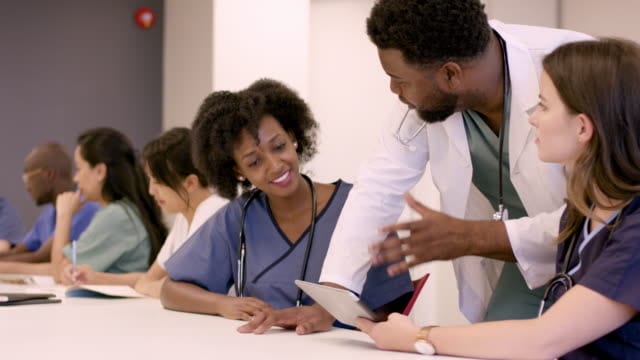How do I get General Practice Medical Work Experience?
The simple and best thing to do is ask! Ring surgeries and ask who an appropriate person would be to speak to about shadowing a clinician. Be polite, professional and flexible with your dates.
You may have more luck getting GP medical work experience if you ask for a half-day or a couple of days rather than asking for a week or more in the first instance. The earlier you start looking around, the more flexible you can be with your dates, which will suit the GP surgery better.
Remember that you cannot do GP placements for medical work experience with your local GP for confidentiality reasons. However, you could always ask your GP if they know anyone else who would be willing to have you. We have an article here that covers finding work experience in more detail.
Why Won’t a General Practice Take Me On?
Many surgeries cannot or will not take on work experience students. Don’t let this dishearten you and make sure you keep asking around! If you’re looking at GP placements for medical work experience further away from home, don’t forget to take logistics into account. You don’t want to find out the evening before that a certain train doesn’t run in the morning.
Another way to get experience could be by asking to shadow a nurse. Allied health professionals are incredibly important to medical practice and observing a nurse’s work will also give you some valuable insight.
If you’re unable to get work experience, don’t worry, there is a newly released platform that allows you to gain a virtual work experience and show your interest in the field without having to physically be there. This has become especially important during the COVID-19 pandemic. Read on for more information on Observe GP, the virtual medical work experience platform.
What can I expect with General Practice work experience?
People who complete GP medical work experience often expect to be able to observe surgery, but this may not be the case. You may be offered work experience which is predominantly admin rather than shadowing.
Don’t worry though, as this is still worth doing if you can get further experience elsewhere as it gives you insight into the huge amounts of data that GP surgeries handle. As well as how much teamwork is required to make the whole system function.
A few days doing filing can be worthwhile, and the GP surgery may then follow up and offer you some shadowing opportunities, so don’t dismiss it. However, do also try to ensure that you can observe some hands-on medical practice at some point before application.

If you do observe surgery, that’s great! Take lots of notes and remember to thank the GP or nurse for letting you sit in. If you get an opportunity, try to discuss the consultation with a medical professional. Their insights will give you valuable insights into the judgements they made and why. There are no silly questions; it’s better to realise you’ve misunderstood something at this stage than to realise in front of an interviewer!
Get your FREE Medical Work Experience Guide
Figuring out your medical work experience can be tough, but our free guide will help you navigate the world of medicine placements. Discover what you should expect from common placements, tips for finding your placement and a helpful sheet to keep track of your work experience contacts. Fill out the form below to gain instant access now!

How To Get The Most Out Of General Practice Work Experience
Talk to the GP surgery manager and doctors about what you are allowed to do and see at the surgery.
Some GP surgeries are apprehensive about Sixth Formers sitting in on GP consultations, whereas other will be more than happy to (obviously with the consent of the patient). Alternatively, if you are lucky, you may be able to talk to patients about their experiences whilst they are waiting to see the GP – something you could even suggest.
If you are unable to see patients, it is not the end of the world, you can still gain a lot from seeing how the GP surgery works.
Talk to the doctors and staff about working at a GP surgery and see if they have any interesting ethical or legal stories that you could discuss in your personal statements (anonymised obviously). Sit with the receptionists, as they are often the very first people to see the patients, and have other tasks such as organising the prescriptions and consultations – something that is important for you to see.
Another useful thing to do is to think about the role of GPs in the NHS.
How do they fit together with other healthcare services? GPs are often described as the “Gate-Keepers of the NHS” and are vital to work out who needs further test or treatments in hospital. They also are heavily involved in the long-term care of many patients, some of whom see there GP nearly every week – individuals with chronic conditions. Keeping these things in mind during your time at a GP work experience placement will greatly inform the things you see. Think about the experience you have and how what you saw fits in with the rest of the NHS – there is certainly plenty to discuss in your personal statement.
Finally, make sure to ask as many questions as you can about what you see, what it’s like working as a GP, and how the NHS works.
GPs spend a large part of their job explaining things to patients so will be very well equipped to explain all this to you, giving you a good opportunity to understand the healthcare system in greater detail (something that definitely set candidates ahead of the pack in interviews).
Final Words
We’ve said it plenty of times but it’s good to drill the importance of making the most out of our GP work experience. It’s a great opportunity to not only see whether medicine is right for you but also to enhance your application. Interviewers will often look and ask about your own experiences of how the healthcare system operates and this is a great way of gaining an understanding.
Are you searching for effective Medicine application support?
UniAdmissions Medicine Oxbridge Programme is designed with the sole focus of getting you your dream offer. Students enrolled on our Programmes have triple the chances of success. Not applying to Oxbridge? Click here for our Non-Oxbridge Medicine Premium Programme.
Get started with your Medicine Premium Programme today and triple your chances of success!







